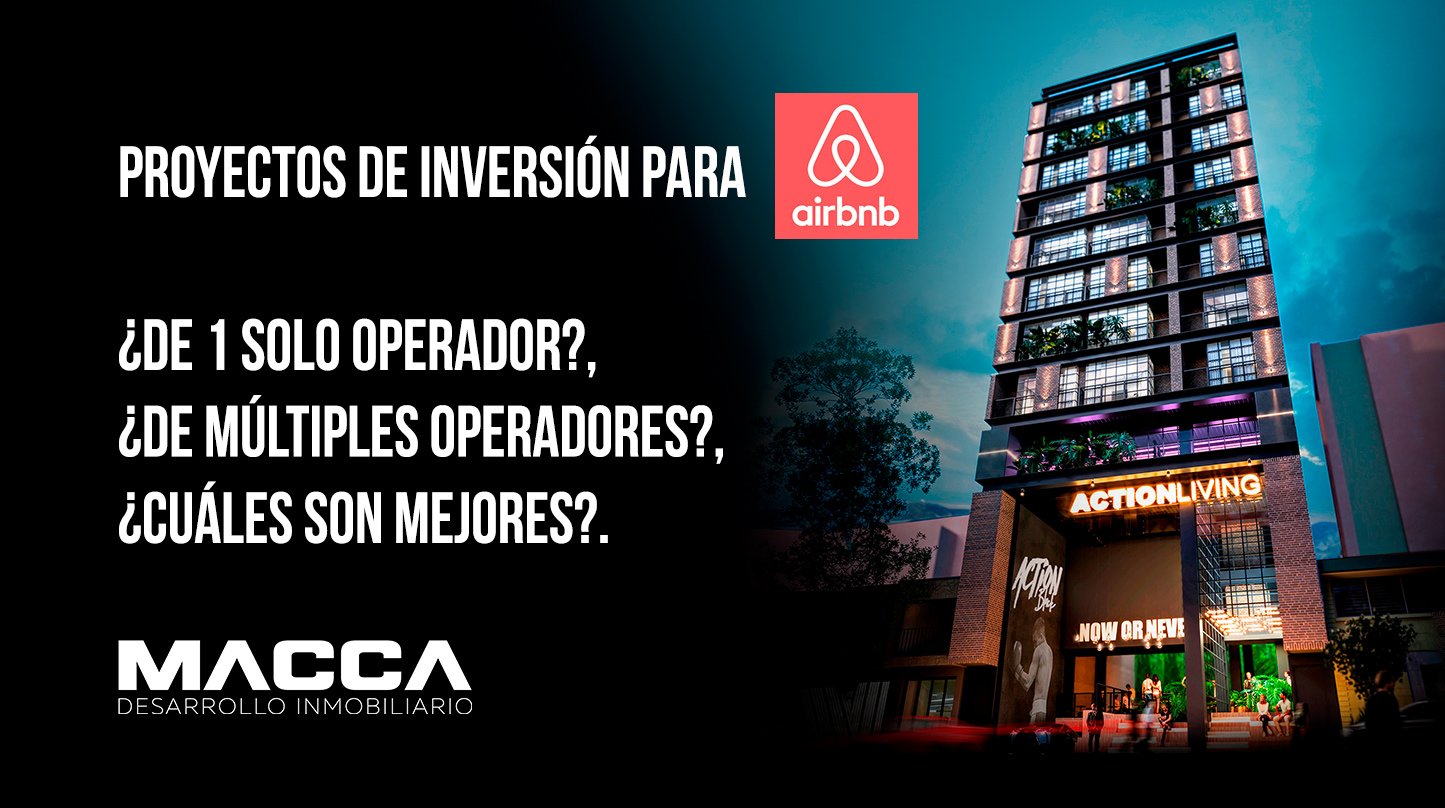Due to the tourism boom that Colombia and especially Medellin is experiencing, the need to expand the tourist offer of the city has led many to see as an investment alternative to buy properties to rent them on platforms such as Airbnb or invest directly in projects developed for this purpose. Today we will explain the modalities of these projects and why some are better than others.
Types of Airbnb investment projects:
To make things simple and easy to digest, we will refer to the 2 main types of investment projects for Airbnb rentals in Medellin. These two types are: Single investment projects with multiple operators and the single investment projects with single operator and collective rentals.
There are many differences between the two, one of them is that in multiple operator projects each owner rents his apartment or suite individually and independently, while in single operator projects one company operates all the apartments or suites as if it were a hotel and the owners only play the role of investors.
Below we will review the pros and cons of each and at the end we will give our conclusions:
Projects with multiple operators:

Projects with multiple operators:
These are projects where each owner decides how to operate his asset, whether he does it himself or hires a third party. It is normal for these projects to have a management service similar to that of traditional residential buildings, which is an extra cost for the owner.
Pros:
Your apartment, your rules: In an investment of this type, the builder gives you your apartment in white work and you furnish it as you want, then you set the price and the rules you want, you are in charge.
2. Highest possible profitability: If you are very efficient in costs and set your prices very high, surely your expected return will be higher, provided that you manage your property yourself and do not have costs associated with third parties or employees.
3. You can use or lend your apartment whenever you want: Since you are the operator yourself, it will be easy and convenient for you to put your investment to the use you want. Lending your suite to family or friends should not be a problem for you.
4. You can sell whenever you want: As an owner you can sell your apartment or suite whenever you wish.
Cons:
1. What other operators do affects you directly: Let's say you bought in a great project with a great location, then you furnished your apartment ideally and priced it well to have good profitability. Then you realize that your neighbors start to lower their prices to have more reservations which affects your investment directly. In this situation there are no intermediaries to establish base rates and you are practically at the mercy of the other operator and their willingness to have similar prices.
2. There are no general rules and no one to enforce them: In projects with multiple operators, defining rules of coexistence, types of tourists accepted or internal rules so that each suite operates in a similar way is almost impossible. In our city, situations such as sex tourism and drug tourism are very difficult to control, even more so when there are multiple operators. If an operator wants to have permissive rules in his property, this is something that for the other operators and owners is very difficult to manage. Usually a single bad operator can damage the reputation, quality and profitability of the other investors in a multi-operator project.
3. You have to do all the work or pay for someone else to do it: If you have decided to invest in a real estate project of rentals for Airbnb with multiple operators, you should know that instead of being a real investor, what you did was to buy a self-employment. Renting an apartment on digital platforms may seem simple, but it requires a lot of work, starting with furnishing the suite or apartment correctly, knowing what really makes the value of the property go up and what the tourist is really looking for, then there is taking the right photos, making the travel guide, creating profiles on OTA's (Online Travel Agencies), creating the ads and putting the right prices for each season, attending to questions from potential guests, preparing everything for the arrival of the guests, making sure to do immigration control if they are foreigners, attending to them in several languages, giving them tourist tips and recommendations, attending to emergencies (there are many), preparing cleaning services, doing damage control once they leave the property, making sure to have good reviews and fixing the bad ones and then starting again every 3 or 4 days.
It sounds exhausting, right? many people try it and then end up hiring third party companies or independent operators who can charge up to 25% of the value of the sale, this added to the percentage retained by Airbnb or booking, affecting their profitability.
4. Guests or residents can have different types of experience: Depending on the operator the guest experience can be great or a complete disaster that leads to early termination of the contract. This happens more than you think since there are no clear rules between operators, the activities of some guests such as noise, bad smells or unwanted visitors can affect the experience of others.
5. You must work when everyone else is resting: Now imagine this situation, it is a holiday weekend and you decided to go out of town with your family, on Sunday at 11 pm your guest writes to tell you that there is damage in the shower and can not take a bath, what do you do? These situations are more common than you think and usually happen in the least expected moments, that's when you should leave your moment of rest and get to work to solve your guest, because if you don't do it, it can cause you a bad review on Airbnb which would make you lose many customers.
Single operator projects:

Single operator projects:
In these projects, the owners and investors only act passively, reviewing the operator's management and receiving their income on a monthly basis (or in the period defined).
Pros:
1. You don't have to do all the heavy lifting: In single-operator projects, the entire building functions more like a hotel than traditional apartments, where the operator takes care of everything. This facilitates both the guest experience and the internal workings of the building. It is also important to make it clear that in this model investors would not have to take care of minor guest issues such as accidents, emergencies, damages or special requests as everything would be the responsibility of the operator.
Greater control of rates and occupancy: By having full control over rates and occupancy, the operator can play with prices to improve bottom line margins and have more stable returns. If the building has low occupancy, prices in general can be lowered to attract more sales, in the opposite case if occupancy starts to rise, then prices will also rise, which would generate higher profits for investors.
3. More stable returns: In single operator models with a "rental pool" it does not matter if an investor's suite was under- or over-occupied, as all investors share in the overall profits of the entire business. To make it easier to understand, let's say the hotel is at 75% occupancy for a month and generates some money in sales, out of that money comes operating costs and expenses, taxes (less property taxes) and the operator's commission which is generally (depending on the scope) between 10%-15% on profits not on sales which forces the operator to be efficient in its management. Then the money from the available profit is distributed by coefficient to the investors month by month achieving in many cases returns around 1% monthly.
4. Greater control of guests: A single operator can exercise full control over the rules of the asset, what is allowed and what is not. This is extremely important when it comes to building a lasting reputation for the property on digital platforms. Having more control avoids problems between guests, even improves the relationship with police, tourism police and other control entities, and also generates more confidence from future guests who look at the reviews on the booking platforms before making their reservations.
5. You can sell whenever you want: In most projects, whether you have fiduciary rights or real estate registration, selling should not be a problem, especially when you sell a property with rental potential, the only thing necessary is that the buyer wants to adjust to the business model of a single operator.
6. Front desk 24/7: Having a similar experience to a hotel, these single-operator projects usually have a 24-hour front desk, being able to solve customer problems at any time and even giving the opportunity to check-in at any time, even at 2 am.
Cons:
1. You can't do whatever you want: As an investor in an Airbnb rental real estate project with a single operator, you must be clear that you must play by the rules established by all investors along with the operator, for example using your suite for a long time can take away profitability to other investors, so often these types of projects have administrative charges to mitigate the drop in profitability in case an investor decides to use your suite.
2. You cannot lend your suite*: To guarantee profitability and good operation, the operator must have total control of the asset, in many cases the operators do not allow the loan of the suite or apartment since it is difficult to control that they are not doing business underneath, which affects the profitability of the other investors. Most operators only allow loans to family members in the first degree of consanguinity.
3. You are subject to negotiation with the operator: Although the owners' meeting may decide to change the operator, the general rule is that once an agreement has been reached, it is respected and all the investors in the project are subject to it.
Conclusion:
After having seen the pros and cons of each one, we can see that their differences are marked and the choice at the time of investing will depend on the tastes of each person, there are those who prefer to manage their investments themselves and there are those who have neither the time nor the disposition and just want to put their money to produce.
In our case and from our experience in the industry, our recommendation when a project is created from scratch in order to have real estate units for rent on platforms such as Airbnb, is that it is done with the model of a single operator, as this can give the asset an added value of hotel services facilitating the guest experience and creating a solid brand that future customers seek and feel confident to book their stay.



